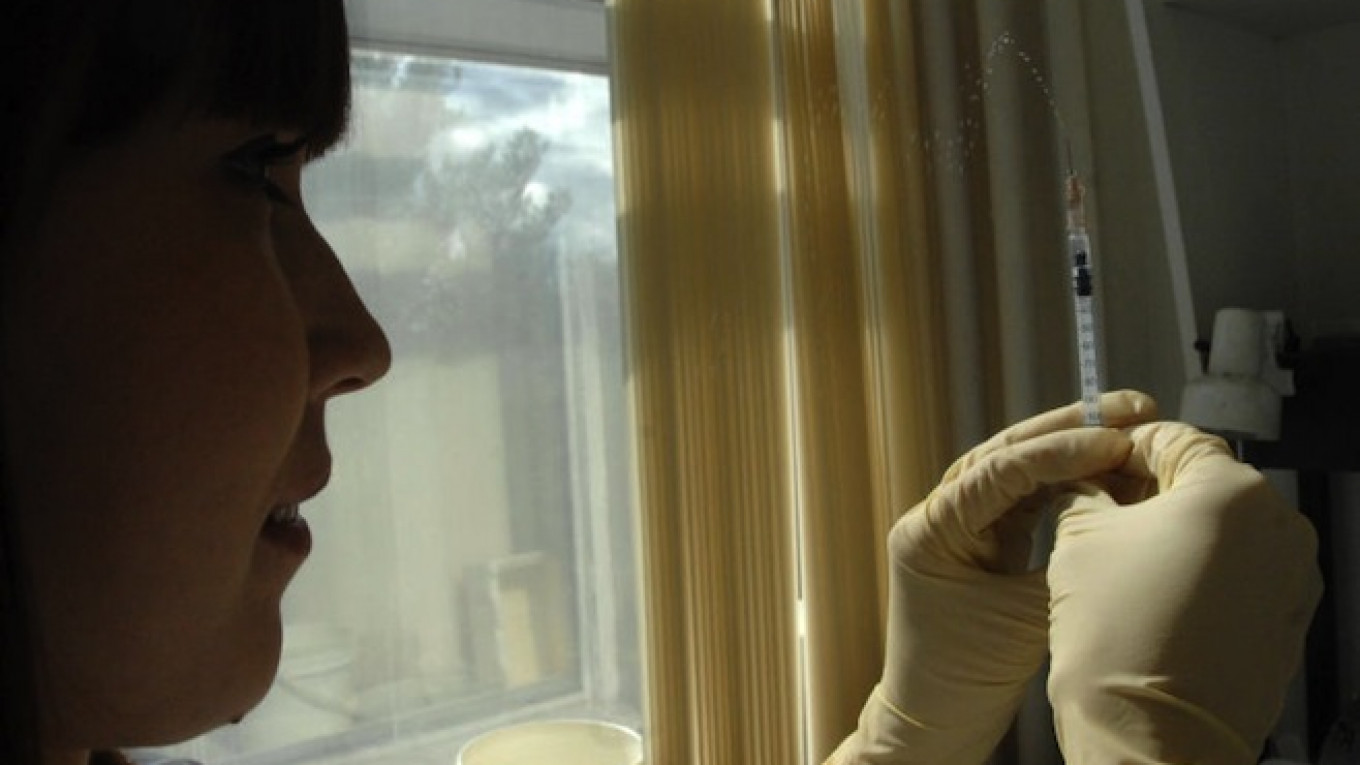When Russian health care officials announced last week they would start replacing foreign HIV medication with drugs produced in Russia, patients' rights advocates were quick to point out that HIV patients have complained that domestic drugs are ineffective and have undesirable side effects — but patients themselves say that drug shortages are a far bigger problem for them.
Medical experts and NGO activists agree that the move over to domestic medication — announced as part of the import substitution campaign sweeping Russia — pales in comparison with frequent drug deficits all over the country that force patients to wait for months for their treatment.
“The number of HIV patients [in Russia] is increasing faster than the funds to finance treatment, and the worsening economic situation is contributing to it too, so the lack of funds is an issue [in drug shortages],” said Vadim Pokrovsky, head of the Moscow-based Federal Center for Fighting AIDS and Russia's most renowned specialist in the matter.
The number of registered cases grows every year and is very likely to reach one million by 2016, Pokrovsky told The Moscow Times in written comments.
“The number of registered HIV patients has reached 950,000. … Forty-thousand new cases were registered in the first six months of 2015, so it's very likely that in 2016, or even by the end of 2015, we will register the millionth patient,” he said.
At the same time there are a certain number of patients who have HIV but who haven't been officially diagnosed with it yet, Pokrovsky said, so the overall number of people living with HIV in Russia could be as many as 1.3 million already.
The shortfall between funding and patient numbers is one of the reasons that thousands of patients in Russia who rely on state-funded treatment often suffer from a shortage of drugs, said Andrei Skvortsov, a coordinator at the Patients In Control initiative that launched Pereboi.ru, a project that monitors medication supplies all over the country and helps HIV patients cope with shortages.
Fixed Budget
As the number of HIV patients grows, the demand for medication increases too, but the state budget for treating them — a three-year plan drawn up by the Health Ministry — remains the same, said Skvortsov.
“We wrote a letter to Skvortsova [Russia's Health Minister], asking for an increase in funding for HIV medication, but shortly after we submitted it she claimed in public that it wasn't necessary,” he told The Moscow Times.
Right now HIV patients in 30 Russian cities are complaining about a shortage of drugs, Skvortsov said. The situation is particularly difficult in Crimea and Sevastopol, where health care officials are struggling with the transition from Ukrainian treatment standards to Russian ones following Russia's annexation of Crimea last year.
“Before, [HIV patients in Crimea and Sevastopol] were treated under the Ukrainian system — they were taking different medication, different drugs were used and so on. And now [health care officials] are having a hard time figuring out what to procure,” he said.
Difficulties in obtaining medication around the country became significantly worse in 2013, after the procurement of medication was decentralized.
“The Health Ministry used to collect requests from the regions and carry out all the necessary tender procedures. In 2012 it became the responsibility of regional administrations,” Skvortsov said.
After that, drug shortages became a common problem. Tenders were conducted late, complicated logistic schemes proved ineffective, prices grew, and regions sometimes spent different amounts of money on the same medication.
Homegrown Solution?
As prices for foreign brand-name medication have grown, exacerbating the situation, producing cheaper generics in Russia as part of the import substitution strategy might be the solution, experts say.
“The production of generics is one of the cheapest methods of providing treatment to most of the patients,” Pokrovsky from the Federal Center for Fighting AIDS told The Moscow Times.
“Generics are dozens of times cheaper to produce [than brands] because there are not the expenses of creating a drug, developing it and conducting clinical trials usually included in the price of a brand-named medication,” he said.
There are Russian-made generics, and some patients have already started taking them, but according to a member of the Public Council of the Health Ministry, Alexei Starchenko, they're less than happy with them.
“We have received dozens of complaints from patients saying that [the effect of] the [Russian] medication can be compared to [that of] water,” he said, claiming that patients had started experiencing the same symptoms they had had before they started receiving treatment, he told the Russian News Service radio station earlier this month.
“It's a disaster. A mistake was made, the wrong decision was made,” he added.
But not all those living with HIV agree.
“I've been taking Russian drugs since December [2014], and have experienced no negative side effects,” said Maxim, an HIV patient who asked for his last name to be withheld.
“I can say the same thing about a lot of people I know who are on Russian medication now,” he told The Moscow Times in a phone interview.
Another HIV patient, Lyudmila, who also asked for her surname not to be published, said that some Russian-made drugs made her feel worse, but others didn't.
“There's a Russian drug Nikavir — I almost died after taking it. I complained a lot [to my doctors] about it and they replaced it with Russian Tenofovir, and it's OK,” she told The Moscow Times in written comments.
“There are quite good Russian medications, but some really good [foreign brand-name] drugs aren't produced here,” Lyudmila added.
At the moment there is no solid evidence that Russian generics are worse than the brand-name medications, said Pokrovsky. “But since there are complaints — however subjective — research into the matter should be conducted,” he told The Moscow Times.
“There have been maybe five complaints [to activists of Pereboi.ru] about Russian generics,” but they mostly concerned individual reactions to certain medication — the same type of reactions a lot of people experience after taking imported drugs, so it's currently stretching the truth to call it an issue, agreed Skvortsov.
Pills, Pills, Pills
“The thing that concerns me more is the lack of dialogue between a doctor and a patient,” said Maxim. “The attitude is 'you're going to take what we give you,'” and no one cares, for instance, that it might be inconvenient to take nine pills a day instead of five, which often happens when a foreign drug is replaced with a Russian analogue, he said.
One of the most important things in treating HIV is precision, Maxim said: Patients have to take the pills at the right time every day, and when there are twice as many pills, it prompts the urge to take a break from constantly taking them.
Pokrovsky from the Federal Center for Fighting AIDS agreed.
“In Russia, combination medications — one pill that contains all three necessary substances — are rarely used, meaning Russian patients have to take from nine to 12 pills a day instead of one or two, which is very inconvenient,” he told The Moscow Times.
The Federal Anti-Monopoly Service is to blame, the expert added: It forbids the purchase of combination medications, which are usually more expensive than the same three substances put into three different pills.
Another problem with generics, according to Skvortsov from Patients In Control, is that often the prices set for them in Russia aren't much cheaper than the brand-name drugs.
“A generic may cost one ruble cheaper, but not 15 percent cheaper like in Europe,” he said.
“Pharmaceutical companies want to make money and so they set high prices, the Health Ministry says they can't do anything about it and won't increase the budget [for HIV treatment]. It's a vicious circle,” Skvortsov said.
Tackling the Causes
The spreading of HIV could be slowed down by preventive measures, said Pokrovsky.
There should be widespread educational campaigns about the disease, including ones dedicated to safe sex practices, as well as specialized programs for drug addicts to stop them from sharing syringes, he said. Ideally, he added, they would also be given substitution therapy — but such treatment, in which heroin is substituted by a legal alternative such as methadone — is currently banned in Russia.
“At the moment, these measures are either not carried out enough, or they are not carried out at all,” Pokrovsky said.
“In the grand scheme of things, that's what bothers me a lot too,” agreed Maxim, the HIV patient. “HIV continues to spread, despite the things officials say out loud,” he said.
Instead of scientifically proven methods like substitution therapy for drug addicts or sex education lessons in schools, officials promote obscurantism, he said. “They talk about loyalty [to your partner], Orthodoxy and spirituality and claim they will treat everyone,” Maxim told The Moscow Times.
But even after thorough treatment that leads to a remission, a lot of patients who are former drug users return to their addiction, he said, making preventive measures important at every stage.
Moscow health care officials disagree.
“Sex education in schools will increase children's interest in sex and spark an outbreak of HIV and other sexually transmitted deceases,” Lyudmila Stebenkova, a deputy in the Moscow City Duma and the head of its health care commission, was cited by Kommersant newspaper as saying in May.
Contact the author at [email protected]
A Message from The Moscow Times:
Dear readers,
We are facing unprecedented challenges. Russia's Prosecutor General's Office has designated The Moscow Times as an "undesirable" organization, criminalizing our work and putting our staff at risk of prosecution. This follows our earlier unjust labeling as a "foreign agent."
These actions are direct attempts to silence independent journalism in Russia. The authorities claim our work "discredits the decisions of the Russian leadership." We see things differently: we strive to provide accurate, unbiased reporting on Russia.
We, the journalists of The Moscow Times, refuse to be silenced. But to continue our work, we need your help.
Your support, no matter how small, makes a world of difference. If you can, please support us monthly starting from just $2. It's quick to set up, and every contribution makes a significant impact.
By supporting The Moscow Times, you're defending open, independent journalism in the face of repression. Thank you for standing with us.
Remind me later.






